EWS Reservation- Supreme Court Constitution Bench Hearing DAY 2- LIVE UPDATES
LIVELAW NEWS NETWORK
14 Sept 2022 10:33 AM IST

Live Updates
- 14 Sept 2022 11:56 AM IST
Kumar: Why? Because first census was conducted in 1872, and it was a comprehensive census operation. Every aspect- membership, family, occupation, property holding and more importantly, membership of religion, caste, race, language were all collected. '72 it was done, '81...
Next Story


